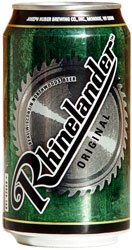
I recently picked up some Rhinelander beer for $5 a 12-pack. Why? Because there's nothin' like the pure, clean taste of the Northwoods.
The "pure, clean, taste of the Northwoods"...what exactly does this mean? If you've ever been to Northern Wisconsin (or in my case, Northern Michigan) you've no doubt enjoyed the clean, fresh air. That's what Rhinelander beer tastes like to me; like a clean breath of fresh air. The crisp malt flavor is like the first breath I take early in the morning up at the lake. The genius of the flavor of Rhinelander beer is in it's simplicity. According to the Huber Brewery, Rhinelander is made with two-row malt and Galena hops, water and yeast. That's simplicity in a bottle, or these days, a can.
Rhinelander Original, formerly known as Rhinelander Export, has a fairly long history in Wisconsin. According to the Cheap Beer Server, Rhinelander was originaly produced in Rhinelander, Wisc., starting in 1882. The brewery was successful with this beer up until the early 1960s, when the brand was bought by the Huber Brewery, much further south in Monroe. I've never tasted the original Rhinelander, so I can't say if the beer has changed much through the past few decades, but I can say that it hasn't changed much in the last few years since I started drinking it.
Huber recently decided to put Rhinelander in cans instead bottles, which pretty much coincided with the phasing out of venerable returnables. My first encounter with Rhinelander beer was in these heavy, brown returnable bottles. To be precise, I first encountered Rhinelander Bock, which I believe is no longer produced. A few years later I was able to try the pure, golden Rhinelander beer. The beer with the "Rhine taste", whatever that is. Anyhow, I miss the returnables, but for now I'll buy the beer in cans, especially when it's on sale.
Rhinelander is a great summer beer that offers more real beer flavor than Budweiser, Miller and Coors products.